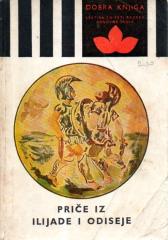Homer
Homer (griechisch Ὅμηρος, Hómēros) war ein griechischer Epiker (8. Jahrhundert v. Chr.). Mit Ausnahme einiger hellenistischer Philologen galt Homer in der gesamten Antike als Autor der ältesten Texte der griechischen Literatur, der Epen Ilias und Odyssee. Aus zahlreichen Spätbiografien ist es unmöglich, einen verlässlichen historischen Kern zu extrahieren; Die moderne Kritik auf der Grundlage archäologischer, kultureller und sprachlicher Hinweise datiert die Epen mit hoher Übereinstimmung in die zweite Hälfte des 8. Jahrhunderts. Chr Chr.: Ilias um 750, Odyssee um 725. Da in den Liedern der ionische Dialekt vorherrscht, wird angenommen, dass Homer ursprünglich aus Ionien stammte; Bei den Spekulationen um seinen Geburtsort genießen das kleinasiatische Smyrna und die nahegelegene Insel Hij einen gewissen Vorteil.
Im 17. Jahrhundert kamen Zweifel an der Historizität der Person Homers und seiner Autorschaft zweier Lieder auf. Jahrhundert (François d'Aubignac) und im 18. Jahrhundert verstärkt. Jahrhundert (Giambattista Vico, Ignjat Đurđević), als es im Werk von Friedrich August Wolf (Einführung in Homer – Prolegomena ad Homerum, 1795) seinen Höhepunkt fand. Seitdem gibt es in der homerischen Philologie eine heftige Debatte über das sogenannte Analytiker, die die Möglichkeit bestritten, dass eines der Epen das Werk eines einzigen Autors war, und Unitarier, die die einzigartige Urheberschaft der Ilias und der Odyssee verteidigten oder für jedes Epos einen eigenen Autor annahmen. In den 1930er Jahren brachte die Entdeckung der mündlichen Bedeutung von Homers Gedichten durch den amerikanischen Philologen Milman Parry neues Licht in diese Debatte und lieferte überzeugende Antworten auf einige Einwände der Analytiker, wie etwa die Wiederholung von Versteilen, ganzen Versen oder Fragmenten.
Allen Berichten zufolge war Homer einer der Aeds, der, wie die von Parry studierten südslawischen Geiger, sein Repertoire ausbaute, indem er Lieder älterer Sänger übernahm. Seine Innovation muss darin bestanden haben, dass es ihm gelang, anstelle von Liedern üblicher Länge, die für eine einmalige Aufführung gedacht waren, Geschichten zu schaffen, die die Aufmerksamkeit der Zuhörer auch dann fesselten, wenn sie in Fortsetzungen aufgeführt wurden (die Aufführung der Ilias dauert etwa zwanzig). Stunden - vier oder fünf lange Abende). Gleichzeitig verband er, wie alle mündlichen Dichter, Erinnerung und Improvisation: Er formte das, was er von anderen Sängern hörte, anhand des erworbenen Repertoires an Formeln, typischen Szenen oder Themen.
Die Ilias und die Odyssee, die an der Schwelle zur griechischen und gesamteuropäischen Literatur entstanden, sind sicherlich die meistgelesenen nicht-heiligen Texte der westlichen Zivilisation. Doch ihr enormer Einfluss ist nicht nur eine Folge der chronologischen Priorität, sondern auch ihres einzigartigen ästhetischen Wertes. Die Griechen sahen in ihnen unerreichbare literarische Werke, aber auch eine Quelle unterschiedlichster Erkenntnisse: mythologischer, theologischer, ethischer, sprachlicher, historischer, geographischer, naturwissenschaftlicher Art und wiesen ihnen daher eine zentrale Stellung im Lehrsystem zu.
Die römische Literatur beginnt mit der Übersetzung der Odyssee, und bis zum Ende der heidnischen Antike ist Homer der bleibende Meilenstein darin. Im Westen wurde die mittelalterliche Homer-Rezeption durch eine Sprachbarriere behindert, und in der frühen Neuzeit setzten einflussreiche Dichter wie Scaliger Vergil für ihn voraus. Homer wurde im 18. Jahrhundert als kanonischer Autor wiederentdeckt. Jahrhundert, vor allem in England (Alexander Pope, Robert Wood) und Deutschland (Gotthold Ephraim Lessing, Johann Gottfried Herder, Johann Wolfgang Goethe, Friedrich Schiller, Johann Joachim Winckelmann). Unter den Kroaten wurde die Ilias von Rajmund Kunić aus Dubrovnik (1776) auf Latein gesungen, die Odyssee von seinem jüngeren Zeitgenossen und Mitbürger Bernard Zamanja (1777) und beide von Tomo Maretić (1882–83) auf Kroatisch.
Titles in our offer
Odiseja
Homer's "Odyssey" is a classic work that takes us on an epic journey through the mythological world.
Priče iz Ilijade i Odiseje
Das Buch präsentiert eine Auswahl von Episoden aus Homers Epen, der Ilias und der Odyssee, adaptiert für jüngere Leser und Schulkinder. Diese Klassiker der griechischen Literatur, geschrieben im 8. Jahrhundert v. Chr., schildern Heldentaten, menschliche L

